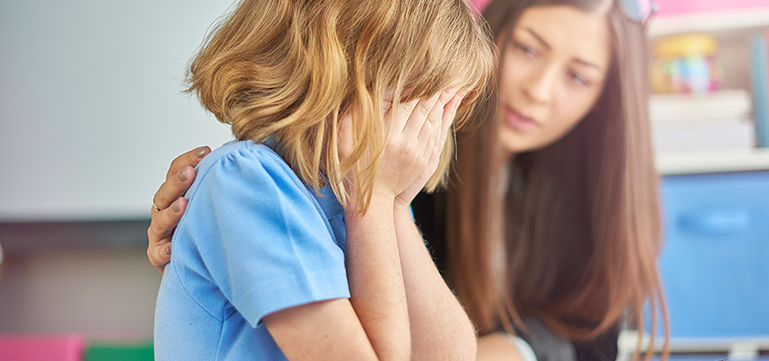Tag: Well-being, care, support and guidance

Estyn is responsible for checking standards and the quality of education in Wales. We inspect schools and give regular advice about education to the Welsh Government and other relevant organisations.
We’re totally committed to ensuring that every child in Wales has the right to feel safe in school, to be looked after properly and to have a say in what matters to them. Bullying is an important issue for us, and one we regularly consider through our inspection activity or thematic reports and when we provide guidance for the Welsh Government.
We’re proud to support the Anti-Bullying Alliance and to promote the 2022 Anti-Bullying Week’s ‘Reach Out’ campaign which takes place from 14 to 18 November.
We recently published a report on a specific type of bullying behaviour which happens between children and young people – peer-on-peer sexual harassment. The report, We don’t tell our teachers, looked at the incidence of peer-on-peer sexual harassment in the lives of secondary-aged young people and also reviewed the culture and processes that help protect and support young people in secondary schools in Wales.
Many of the pupils we spoke to told us that they don’t ‘reach out’ about bullying and harassment. They said that this is because it happens so often that it has become ‘normal’. However, in our discussions with groups of pupils, we were astounded by their willingness to talk about these issues. We found that around half of secondary pupils say they have personal experience of some form of peer-on-peer sexual harassment, with twice as many girls saying they’ve experienced this compared with boys. Young people told us that peer-on-peer harassment happens more online and
outside school than during the school day. However, in school, the most common types of harassment are negative comments about appearance, asking for and sending nude photographs and general negative attitudes towards girls and LGBTQ+ pupils.
For the first time ever, we also wrote a report on our findings specifically for children and young people. This is because so many young people had been honest and brave when talking to us about this important issue. In our report, We don’t tell our teachers, but schools need to know – a report for learners, there is a section which encourages and helps people to address these issues in their schools. Through these reports, we hope more young people can find the same courage and ‘reach out’ to help tackle issues of bullying.
We know that ‘reaching out’ is not as easy as it sounds. But we also know that we need to keep talking about bullying. Before the pandemic, we wrote an important blog about this: Why we need to keep talking about bullying.
In other reports we have written, we have found that for pupils to feel safe to ‘reach out’ about bullying, they have to be satisfied with how their school deals with allegations of bullying (see Healthy and happy – school impact on pupils’ health and wellbeing). They need schools to not underestimate its prevalence, or to dismiss and ignore everyday incidences where pupils make negative or sexist remarks to each other. In our discussions with young people, we also find that young people would welcome more opportunities to discuss sexuality and healthy relationships and are asking for better provision for sex education.
We always consider the important aspects of wellbeing, safety and bullying ahead of visiting a school or provider through our pre-inspection questionnaires which we invite all pupils, parents and carers, staff members and governors to complete. We also ask questions around these aspects in parent meetings and in our group discussions with pupils. Establishing how pupils, parents and carers feel about how well a school handles incidents of bullying influences our activity during the visit. This year, we have been trialling different approaches in our conversations with pupils to
ensure they feel comfortable talking to inspectors. These include inviting pupils to bring a friend along with them to meetings and using creative resources produced in association with leading Welsh academics and experts in this field.
Since our inspections resumed in March 2022, we have been taking a closer look at the culture of safeguarding within providers (see Inspecting a school’s safeguarding culture), including when learners are on-site, off-site, and learning online. We do not investigate individual cases, but we consider the quality and delivery of activities designed to promote well-being and prevent negative, harmful behaviour and attitudes. For example, by looking at how providers promote online safety, deliver personal social and relationships education and provide relevant professional learning for staff. We also talk to pupils and staff about processes to keep them safe and review school documents carefully to establish whether the provider’s safeguarding arrangements are promoting pupil safety and well-being effectively.
We stand together with the Anti-Bullying Alliance and any other organisation that calls out and seeks to tackle bullying.
To all young people we say: report any issues to school staff, a family member, or an adult you trust, and don’t be afraid to talk about it – whatever it may be. Reach out and sort out.
For more information on the work of Estyn visit www.estyn.gov.wales
Follow Estyn on Twitter https://twitter.com/EstynHMI


